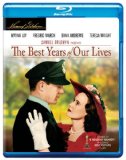| Reviews & Columns |
|
Reviews DVD TV on DVD Blu-ray 4K UHD International DVDs In Theaters Reviews by Studio Video Games Features Collector Series DVDs Easter Egg Database Interviews DVD Talk Radio Feature Articles Columns Anime Talk DVD Savant Horror DVDs The M.O.D. Squad Art House HD Talk Silent DVD
|
DVD Talk Forum |
|
|
| Resources |
|
DVD Price Search Customer Service #'s RCE Info Links |
|
Columns
|
|
|
Best Years of Our Lives, The
Warner Bros. // Unrated // November 5, 2013 // Region 0
List Price: $19.98 [Buy now and save at Amazon]
The hardest thing they ever had to do was go back home.
Al (Fredric March) had spent the past few years as a platoon sergeant in the 25th Infantry Division. It wasn't all that long ago that his boots were on the ground in the Pacific
theatre; now they're stomping into an upscale apartment building in Boone City. His teenaged children are thrilled to see him, but Al hardly recognizes them as his own flesh and blood. There's a noticeable discomfort between Al and his wife (Myrna Loy). Milly is overjoyed at her husband's return, but picking up where they left off three long years ago proves to be more difficult than either of them would've believed possible. The savings and loan where he once worked offers Al an even cushier position, capitalizing on his experience in the service and in finance as a loan officer for servicemen returning from the war. It's no easy thing to wage war for years on end and then sit behind a desk in a bank. It's even more difficult when he has to balance fiduciary responsibility with the sight of his fellow servicemen struggling to eke out a life for themselves. Al sloshes through the days with a drink in his hand.
Al isn't comfortable capitalizing on his time in the service; Fred (Dana Andrews), meanwhile, would leap at the chance. Overseas, Fred was an officer: a decorated bombardier pulling in a hefty salary. Those days are gone, and there's not an employer in Boone City that knows what to do with the skills Fred picked up during the war. Before, he was a soda jerk at a drugstore. These days, no one seems to think he's good for much else, as much a relic of days past as that graveyard of planes -- just like the ones he used to fly -- on the outskirts of town. Married to a glamorous party girl (Virginia Mayo) he barely knows and can't come close to affording, Fred quickly finds himself flat broke. Unable to find solace at work or at home, Fred can't quite turn away from the one beam of light in his life, Al's comely daughter (Teresa Wright).
Homer (Harold Russell) learned to cope with the loss of his hands quite a long time ago. He's mastered the use of his hooks and these days can get around about as well as anyone else. The problem is that while Homer has come to terms, hardly anyone else around him can say the same. Seemingly everyone either averts their eyes or is fixated on his hooks. Well-meaning folk offer to help out as best they can, not realizing that Homer doesn't want to be treated any differently...he wants to show that he can do all of this for himself. Fred and Al look on from inside the taxi as Homer reunites with his family and the girl he'd left behind. "You gotta hand it to the Navy, " says Fred. "They sure trained that kid how to use those hooks." As Al notes through a frown, though, "they couldn't train him how to put his arm around his girl or stroke her hair." Homer finds himself feeling bitter and
alienated, not because he views himself as less of a man but because of the way everyone else looks at him.
None of its central characters look back at their time in the military with regret. One boorish loudmouth decries the politics that led America to war, but no one throughout the film sneers or looks down upon these three men. The Best Years of Our Lives is as patriotic as any film hailing from the 1940s; it's just daring enough to document that with service comes sacrifice. Realized with such honesty and humanity, it's an approach that enjoyed colossal critical and commercial success. The Best Years of Our Lives was a juggernaut at the box office, the most successful film in the seven years following Gone with the Wind, and it took home a staggering nine Academy Awards. Nearly seven full decades have passed since The Best Years of Our Lives first roared into theaters, but its power and resonance haven't diminished in the slightest.
Don't mistake The Best Years of Our Lives for a melodrama. This isn't a film about starcrossed romances or devastating tragedy. There is no overemoting or syrupy strings expressly spelling out to viewers what they're meant to be feeling. The Best Years of Our Lives draws much of its power from its restraint. Where other films would resort to impassioned monologues or reams of dialogue, awkward glances and uncomfortable pauses instead speak volumes. Reeling
emotions are so deeply felt that there's no need for them to be explained. The three returning servicemen in The Best Years of Our Lives are layered, complex, and richly drawn characters. Each of them is bright, determined, and charismatic, refusing to allow himself to be defined by the darkness in his life. The three of them aren't reaching for the stars; they simply want to feel like a part of the world around them, and these men and the lives they left behind have both changed too profoundly for things to again be as they once were. The assured confidence in the writing, direction, and performances leave Al, Fred, and Homer feeling like people rather than cinematic constructs. They're so convincingly real and engaging that The Best Years of Our Lives feels as if it runs a fraction of its nearly three hour length. That sense of reality never fades, even as the film draws to a close. None of these men are rewarded with happy endings in the Hollywood sense. There's a sense of accomplishment and optimism -- that there may be brighter days ahead yet, but the struggles will continue. Their minor victories are hard-earned.
The Best Years of Our Lives approaches perfection as few films have. Cinematographer Gregg Toland again makes masterful use of deep focus, integral here to the visual language of the film. Director William Wyler coaxes a consistently remarkable set of performances from his cast, chief among them that of Harold Russell. This real-life double amputee had been dealt many of the same cards as the character he plays in the film. Despite not being an actor by trade, Russell holds his own alongside a seasoned cast. His confidence, determination, and skill with his replacement hands are endlessly inspiring, but there's an unmistakeable vulnerability there. When he takes Wilma up to his bedroom and bares himself to her -- showing how helpless he is after something as seemingly mundane as putting on his pajamas -- it's devastating, heightened further by the sense that he's drawing from his own anguish. Russell has the unique honor of being the only actor awarded two Oscars for the same performance, and he was the first of only two non-professional performers to win an Academy Award for his acting. Though Wyler and screenwriter Robert E. Sherwood have little interest in big, showy moments, they're able to convey the proper sense of scale when appropriate. The sargasso of abandoned planes made me audibly gasp when I first watched The Best Years of Our Lives, for instance, and the impact continues to resonate with me now. The Best Years of Our Lives isn't a film I passively watch; I'm immersed and wholly escape into it. I struggle to think of more than a tiny handful of films that have left such a profound emotional impact on me. The Best Years of Our Lives easily ranks among the greatest motion pictures of all time, and Blu-ray as a format is richer with its presence. Highly Recommended.
Video
Film preservationist Robert A. Harris has reported that the original camera negative for The Best Years of Our Lives was lost during shipment, and that two unremarkable fine grain prints are all that remain. Having read that unfortunate news months in advance of this Blu-ray release, I braced myself for the worst. Thankfully, Warner Home Video has accomplished quite a lot with the elements available, and The Best Years of Our Lives looks terrific in high definition. Outside of the expected degradation throughout the film's many optical dissolves, clarity and the presence of fine detail are rather impressive, despite varying somewhat from scene to scene. The Best Years of Our Lives benefits further from robust contrast. No scratches, flecks of dust, or assorted wear ever threaten to intrude. A very fine sheen of film grain has been preserved, and it's appreciated that this filmic texture has been skillfully compressed as well. There have been murmurs of overly tight compositions in the film's earliest moments compared to previous home video releases, but I was unable to notice any such concerns, even when I was actively looking for them.
The AVC encode for The Best Years of Our Lives spans both layers of this BD-50 disc. The film's Academy standard aspect ratio has, of course, been preserved on Blu-ray.
Audio
The Best Years of Our Lives boasts a reasonably clean and clear lossless soundtrack, presented here in 24-bit, monaural DTS-HD Master Audio. The reproduction of the film's dialogue leaves little room for complaint, and at no point does the modest background noise pose any sort of distraction. Well done.
There are no other soundtracks on this Blu-ray disc,
although subtitles are offered in English (SDH), French, and Spanish.
Extras
The Final Word
It's somewhat disappointing that a film as widely loved and admired as The Best Years of Our Lives hasn't been honored with a more substantial release. Its sparse extras are holdovers from more than fifteen years ago, the cover art is somewhat anonymous, and Digibook packaging wouldn't have been too much to ask.
Still, none of that diminishes my enthusiasm in the slightest. The Best Years of Our Lives is a classic in every sense of the word, as enthralling and resonant now as it was nearly seventy years ago. Its high definition presentation is everything I could've hoped for and more, and the very modest asking price ensures that The Best Years of Our Lives is that much more of an essential addition to any collection. Highly Recommended.
Al (Fredric March) had spent the past few years as a platoon sergeant in the 25th Infantry Division. It wasn't all that long ago that his boots were on the ground in the Pacific
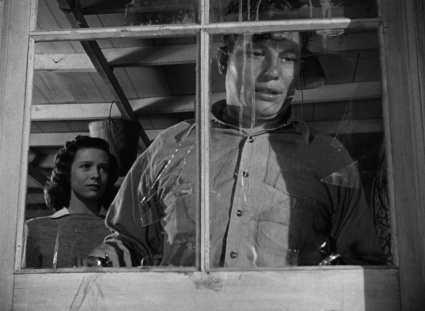 |
| [click on the thumbnail to enlarge] |
Al isn't comfortable capitalizing on his time in the service; Fred (Dana Andrews), meanwhile, would leap at the chance. Overseas, Fred was an officer: a decorated bombardier pulling in a hefty salary. Those days are gone, and there's not an employer in Boone City that knows what to do with the skills Fred picked up during the war. Before, he was a soda jerk at a drugstore. These days, no one seems to think he's good for much else, as much a relic of days past as that graveyard of planes -- just like the ones he used to fly -- on the outskirts of town. Married to a glamorous party girl (Virginia Mayo) he barely knows and can't come close to affording, Fred quickly finds himself flat broke. Unable to find solace at work or at home, Fred can't quite turn away from the one beam of light in his life, Al's comely daughter (Teresa Wright).
Homer (Harold Russell) learned to cope with the loss of his hands quite a long time ago. He's mastered the use of his hooks and these days can get around about as well as anyone else. The problem is that while Homer has come to terms, hardly anyone else around him can say the same. Seemingly everyone either averts their eyes or is fixated on his hooks. Well-meaning folk offer to help out as best they can, not realizing that Homer doesn't want to be treated any differently...he wants to show that he can do all of this for himself. Fred and Al look on from inside the taxi as Homer reunites with his family and the girl he'd left behind. "You gotta hand it to the Navy, " says Fred. "They sure trained that kid how to use those hooks." As Al notes through a frown, though, "they couldn't train him how to put his arm around his girl or stroke her hair." Homer finds himself feeling bitter and
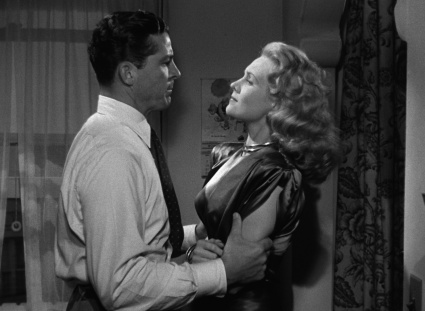 |
| [click on the thumbnail to enlarge] |
None of its central characters look back at their time in the military with regret. One boorish loudmouth decries the politics that led America to war, but no one throughout the film sneers or looks down upon these three men. The Best Years of Our Lives is as patriotic as any film hailing from the 1940s; it's just daring enough to document that with service comes sacrifice. Realized with such honesty and humanity, it's an approach that enjoyed colossal critical and commercial success. The Best Years of Our Lives was a juggernaut at the box office, the most successful film in the seven years following Gone with the Wind, and it took home a staggering nine Academy Awards. Nearly seven full decades have passed since The Best Years of Our Lives first roared into theaters, but its power and resonance haven't diminished in the slightest.
Don't mistake The Best Years of Our Lives for a melodrama. This isn't a film about starcrossed romances or devastating tragedy. There is no overemoting or syrupy strings expressly spelling out to viewers what they're meant to be feeling. The Best Years of Our Lives draws much of its power from its restraint. Where other films would resort to impassioned monologues or reams of dialogue, awkward glances and uncomfortable pauses instead speak volumes. Reeling
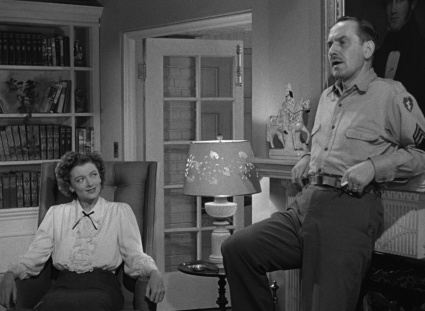 |
| [click on the thumbnail to enlarge] |
The Best Years of Our Lives approaches perfection as few films have. Cinematographer Gregg Toland again makes masterful use of deep focus, integral here to the visual language of the film. Director William Wyler coaxes a consistently remarkable set of performances from his cast, chief among them that of Harold Russell. This real-life double amputee had been dealt many of the same cards as the character he plays in the film. Despite not being an actor by trade, Russell holds his own alongside a seasoned cast. His confidence, determination, and skill with his replacement hands are endlessly inspiring, but there's an unmistakeable vulnerability there. When he takes Wilma up to his bedroom and bares himself to her -- showing how helpless he is after something as seemingly mundane as putting on his pajamas -- it's devastating, heightened further by the sense that he's drawing from his own anguish. Russell has the unique honor of being the only actor awarded two Oscars for the same performance, and he was the first of only two non-professional performers to win an Academy Award for his acting. Though Wyler and screenwriter Robert E. Sherwood have little interest in big, showy moments, they're able to convey the proper sense of scale when appropriate. The sargasso of abandoned planes made me audibly gasp when I first watched The Best Years of Our Lives, for instance, and the impact continues to resonate with me now. The Best Years of Our Lives isn't a film I passively watch; I'm immersed and wholly escape into it. I struggle to think of more than a tiny handful of films that have left such a profound emotional impact on me. The Best Years of Our Lives easily ranks among the greatest motion pictures of all time, and Blu-ray as a format is richer with its presence. Highly Recommended.
Video
Film preservationist Robert A. Harris has reported that the original camera negative for The Best Years of Our Lives was lost during shipment, and that two unremarkable fine grain prints are all that remain. Having read that unfortunate news months in advance of this Blu-ray release, I braced myself for the worst. Thankfully, Warner Home Video has accomplished quite a lot with the elements available, and The Best Years of Our Lives looks terrific in high definition. Outside of the expected degradation throughout the film's many optical dissolves, clarity and the presence of fine detail are rather impressive, despite varying somewhat from scene to scene. The Best Years of Our Lives benefits further from robust contrast. No scratches, flecks of dust, or assorted wear ever threaten to intrude. A very fine sheen of film grain has been preserved, and it's appreciated that this filmic texture has been skillfully compressed as well. There have been murmurs of overly tight compositions in the film's earliest moments compared to previous home video releases, but I was unable to notice any such concerns, even when I was actively looking for them.
The AVC encode for The Best Years of Our Lives spans both layers of this BD-50 disc. The film's Academy standard aspect ratio has, of course, been preserved on Blu-ray.
Audio
The Best Years of Our Lives boasts a reasonably clean and clear lossless soundtrack, presented here in 24-bit, monaural DTS-HD Master Audio. The reproduction of the film's dialogue leaves little room for complaint, and at no point does the modest background noise pose any sort of distraction. Well done.
There are no other soundtracks on this Blu-ray disc,
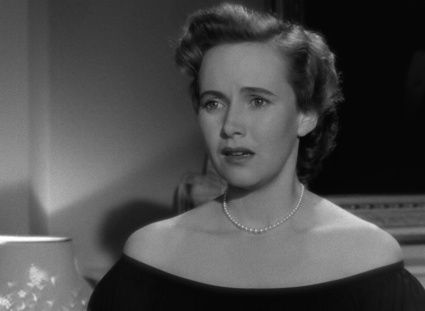 |
| [click on the thumbnail to enlarge] |
Extras
- Introduction (1 min.; SD): Virginia Mayo offers a brief introduction to The Best Years of Our Lives, touching on the film's staggering success at both the box office and the Academy Awards as well as its status as the first film to be inducted into the National Film Registry.
- Interviews (7 min.; SD): Also carried over from the 1997 HBO Home Video release is this set of interviews with actresses Virginia Mayo and Teresa Wright. Mayo speaks about performing in The Best Years of Our Lives and The Secret Life of Walter Mitty simultaneously, the scene she found the most challenging, the perfection of Robert E. Sherwood's screenplay, and how this film legitimized her as a dramatic actress. Wright notes that director William Wyler appeared to enjoy working on this film more than any of their other collaborations together, the one quibble she had with a scene during production, and the inspiration behind a memorable reunion down a long hallway. Far too brief but charming and worthwhile.
- Trailer (2 min.; SD): A theatrical trailer rounds out the extras.
The Final Word
It's somewhat disappointing that a film as widely loved and admired as The Best Years of Our Lives hasn't been honored with a more substantial release. Its sparse extras are holdovers from more than fifteen years ago, the cover art is somewhat anonymous, and Digibook packaging wouldn't have been too much to ask.
Still, none of that diminishes my enthusiasm in the slightest. The Best Years of Our Lives is a classic in every sense of the word, as enthralling and resonant now as it was nearly seventy years ago. Its high definition presentation is everything I could've hoped for and more, and the very modest asking price ensures that The Best Years of Our Lives is that much more of an essential addition to any collection. Highly Recommended.
|
| Popular Reviews |
| Sponsored Links |
|
|
| Sponsored Links |
|
|
| Release List | Reviews | Shop | Newsletter | Forum | DVD Giveaways | Blu-Ray | Advertise |
|
Copyright 2024 DVDTalk.com All Rights Reserved. Legal Info, Privacy Policy, Terms of Use,
Manage Preferences,
Your Privacy Choices | |||||||









